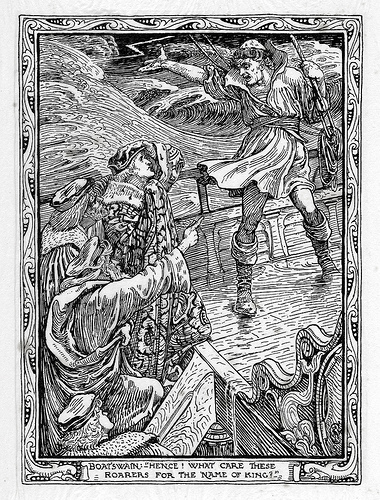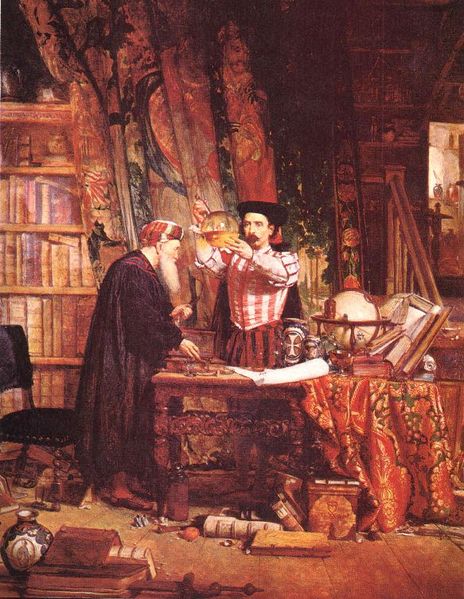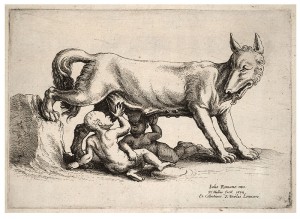“Carrying Tempest in His Hand and Voice”
 Have you ever read The Alchemist and The Tempest at the same time? I don’t mean consecutively, one after the other, but literally, at the same time, Act by Act and scene by scene? If you do, I guarantee you will be amazed to find out how closely the two plays “talk back” to each other.
Have you ever read The Alchemist and The Tempest at the same time? I don’t mean consecutively, one after the other, but literally, at the same time, Act by Act and scene by scene? If you do, I guarantee you will be amazed to find out how closely the two plays “talk back” to each other.
Right from the opening scene, Jonson’s thunderous altercation between Face, Subtle and Doll slaps the audience with an in-your-face parody of The Tempest’s thunderous altercation between The Boatswain, Antonio & Co. and The Master, with “The Master” ingeniously split between the ship’s captain and God himself, king of all roarers, who commands the “Elements”.
In both plays, beastly insults foul the air, with “dogs” as a constant theme. In The Alchemist, Face – who is a mere servant in the house of his absent master – tags his senior partner, Subtle the Alchemist, with several doggy epithets: “You most notorious whelp”; “my mongrel” and “Doctor Dog”. Doll calls them both “perpetual curs.”
In The Tempest, we find the reverse situation, with a passel of frightened Lords barking out the canine curses. Sebastian hollers at the Boatswain, “A poxe o’your throat, you bawling, blasphemous, incharitable Dog!” When the Boatswain dares to backtalk, Antonio roars, “Hang, cur, hang, you whoreson insolent Noise-maker.”
If you look closer, the parallels only intensify. At line 9 of The Alchemist, Doll warns the two growling pups, “Hark, I hear somebody,” after which Subtle snarls, “I shall mar/All that the tailor has made, if you approach.” Compare this to The Tempest, line 10, when Antonio demands, “Where is the Master, Boson?” and the Boatswain growls, “Do you not hear him? You mar our labour/ Keep your Cabins: you do assist the storm.”
 And the correspondences keep on coming. Read the two in tandem, and this image of keeping within cabins will call to mind the claustrophobic setting of The Alchemist, where the trio of cony-catching rascals have set up shop in Lovewit’s house – “Lovewit” being Face’s absent master. The Boatswain’s “You do assist the storm,” will have you flipping back the pages of The Alchemist to find Doll’s attempts to quiet her two madmen, with “Will you betray all?”, and a few lines later, “Will you mar all?” and finally, “Will you be/your own destructions, gentlemen?”
And the correspondences keep on coming. Read the two in tandem, and this image of keeping within cabins will call to mind the claustrophobic setting of The Alchemist, where the trio of cony-catching rascals have set up shop in Lovewit’s house – “Lovewit” being Face’s absent master. The Boatswain’s “You do assist the storm,” will have you flipping back the pages of The Alchemist to find Doll’s attempts to quiet her two madmen, with “Will you betray all?”, and a few lines later, “Will you mar all?” and finally, “Will you be/your own destructions, gentlemen?”
The Tempest’s Boatswain asks a similar question of his “gentlemen” passengers, as he frantically does his best to save the ship:
A plague— [A cry within. Enter Sebastian, Antonio & Gonzalo.] —upon this howling: they are louder then the weather, or our office. Yet again? What do you here? Shall we give o’er and drown? Have you a mind to sink?
As you pick up the scent, each pungent echo leads on to the next. In The Alchemist, Face threatens to turn Subtle in for practicing magic, thus putting the rogue’s “neck/ within a noose.” In The Tempest, Gonzalo says the Boatswain’s complexion is “perfect Gallows.” And why does that “gallows” complexion suddenly stop you in your tracks? Flip some more pages, and you’ll find Face’s vivid description of Subtle-the-bankrupt-and-worthy-to-be-hanged magician, with his “…complexion, of the Roman wash/Stuck full of black and melancholic worms.”
Not convinced yet? Here’s one more, this time beginning with The Tempest, and Gonzalo’s strange comment on the sinking ship:
“I”ll warrant him for drowning, though the Ship were no stronger then a Nut-shell, and as leaky as an unstanched wench.”
Following this “unsavory simile” (so uncharacteristic of Shakespeare, I might add; where else does he so crudely refer to the privy topic of a woman’s menses?), the Boatswain does his best to save them all, but to no avail. In come the wet Mariners, crying, “All lost, to prayers, to prayers, all lost.” Now turn back to The Alchemist, where you’ll find that the raging human storm also climaxes in a cry of “Lost!”:
SUBTLE: Cow-herd.
FACE: Conjuror.
SUBTLE: Cutpurse.
FACE: Witch.
DOLL: O me!
We are ruin’d! Lost!
A few lines later, we hear the shattering of a vessel, as Doll takes matters firmly in hand:
“She catcheth out Face his sword: and breaks Subtle’s glass.“
Subtle’s glass is one of his alchemical vessels, variously termed curcurbits, gripe’s eggs and bolt’s-heads within The Alchemist. In The Tempest, the three uses of “vessel” all refer to the cracked ship, which as we’ve just seen, the author oddly and imprecisely likens to an “unstanched wench”. Which brings us to Doll’s highly significant command to Subtle, after she breaks his alchemical glass: “And you, sir, with your menstrue, gather it up.” Menstrue, as you’ll see if you click the link to George Ripley’s work, was a term used in alchemy, as Jonson no doubt knew, given his mention of Ripley within The Alchemist.
 David Lucking has many more correspondences in “Carrying Tempest in his Hand and Voice“, but he doesn’t seem to know what to make of it all. One conclusion he shyly offers is that Ben Jonson’s cynical Alchemist must be commenting on Shakespeare’s Romantic Tempest, rather than the other way around, as the traditional dating has led scholars to believe. But how does all this intertextuality play out from the Oxfordian perspective, given Oxford’s death in 1604, and the sure dating of The Alchemist to 1610?
David Lucking has many more correspondences in “Carrying Tempest in his Hand and Voice“, but he doesn’t seem to know what to make of it all. One conclusion he shyly offers is that Ben Jonson’s cynical Alchemist must be commenting on Shakespeare’s Romantic Tempest, rather than the other way around, as the traditional dating has led scholars to believe. But how does all this intertextuality play out from the Oxfordian perspective, given Oxford’s death in 1604, and the sure dating of The Alchemist to 1610?
The way I see it, these plays are two golden eggs, hatched by the same cackling bird. Or fraternal twins, nursed on the same rich Shakespearean Boar’s milk. They are anti-masque and masque, the Cain and Abel, or Romulus and Remus, of Ben Jonson’s fiercely independent Novo Orbe.
You cannot fathom the mystery of The Tempest without the aid of The Alchemist. That’s how the Master planned it.
FACE: You might talk softlier, rascal.
SUBTLE: No, you scarab,
I’ll thunder you in pieces. I will teach you
How to beware to tempt a fury again,
That carries tempest in his hand and voice.
FACE: You might talk softlier, rascal.
SUBTLE: No, you scarab,
I’ll thunder you in pieces. I will teach you
How to beware to tempt a fury again,
That carries tempest in his hand and voice.

Recent Comments